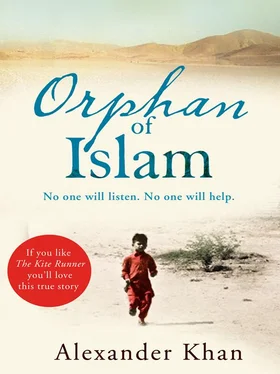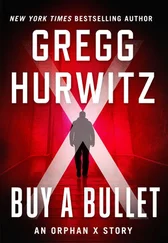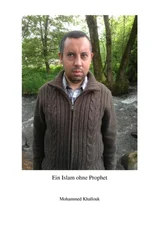Early in the morning I sneaked downstairs and into the kitchen for a glass of water, hoping not to wake anyone.
‘Hey, you … bastarrd,’ a deep, guttural voice called from the front room as I passed.
Rafiq had obviously slept on the settee. I said a quick prayer to God that I’d not woken him up.
‘In here,’ he said, beckoning me to the side of the settee with his index finger.
Terrified, I obeyed him.
‘What was all that howling for last night?’ he said. ‘You better start growing up, boy, and fast. Because I’m in charge now.’
I asked him what he meant.
He laughed. ‘Wait and see, boy,’ he said, ‘wait and see.’
I backed away from him, a nauseous feeling crawling through my stomach. He watched me like a snake watches a mouse. Then he pointed at me.
‘Be very careful, bastarrd,’ he said. ‘I’m waiting for you.’
By 9 a.m. everyone was up, but still dazed from the terrible events of the previous day. Far from being the centre of attention, Jasmine and I were now left to our own devices as more aunties came round to help and the men went to the mosque at the top of Hawesmill to wash Dad’s body, which had just been delivered there by the undertaker. This is an important ritual in Islam. The body must be purified before burial and the male relatives of the deceased will wash it before wrapping it in a shroud. I was told I wasn’t allowed to go with them, because I was too young. I wasn’t sorry; I imagined the men lifting Dad up to wash him at a sink, his head flopping forward and his legs buckling under him as they applied a flannel to his face. The thought horrified me.
Abida spent most of the day in the kitchen, attended by female visitors, while Fatima bustled about, cooking samosas and making tea. Like many Muslim families, we didn’t have an electric kettle. The preferred method was to set a large pan of water to boil on the stove, into which were placed tea bags, plenty of sugar and milk. Once this was ready, it would be transferred to a teapot.
We were sent out to play in the alley behind the house. Jasmine was very subdued and kept going back inside to hang around with the women. I stayed outside, kicking a saggy football against a nearby back gate until the owner of the house came out and gave me a bollocking. When he realized who I was, he stopped shouting and blessed me instead. Then he told me to bugger off.
For hours I wandered around the dusty pothole-riddled backstreets around Hamilton Terrace, trying to picture all the people who’d lived around here before me. We’d done a bit about it in school. Our teacher had showed us old photos of white kids without shoes, their faces all dirty. The men and the women all looked the same: same clothes, same flat caps, same headscarves. They looked tired and fed up. They looked like the people living around Hawesmill now, except a different colour. Nothing nice ever seemed to happen around here. No parties, games, music, fun, laughter. The evening shadows were lengthening across the slated roofs. I couldn’t put off the dreaded moment any longer and lifted the rusty latch that led into the backyard of number 44.
Through the kitchen window I could see Abida and Fatima. The door was slightly open and as I walked up I could hear them talking.
‘Oh, Fatima,’ Abida wailed, ‘what’s to be done? Ahmed had no money, nothing put by for a rainy day. And all these children around. What will I feed them with? I don’t know where to begin, I really don’t.’
I moved closer to the door and saw Fatima touch Abida’s arm.
‘Then you should do what Rafiq suggests,’ she said, ‘and let him move in. It makes sense and it is not unfitting. It is the right thing.’
‘But he’s no good with the children,’ Abida said. ‘They irritate him.’
‘He will learn,’ Fatima replied, ‘and I hope he will be strict. My brother was far too soft. They need bringing into line. Especially you-know-who …’
At that moment I walked in. ‘Hello, aunty,’ I said, as brightly as possible.
Caught in the act, Fatima looked away for a moment. ‘Ah, Mohammed,’ she said, ‘and where’ve you been?’
‘Out playing.’
‘Playing?! And your father’s dead just one day. How irreverent. I hope you’ll be attending mosque for prayers this evening. Go upstairs and wash.’
‘Don’t bother him, Fatima,’ Abida whispered quickly, ‘he’s still in shock. They’re all wandering about like lost lambs.’
‘Oh come on, Abida,’ Fatima snapped, ‘the boy’s 10. He should be acting like the man of the house, not some urchin in the street. Go on, Mohammed, get washed!’
Abida went quiet, deferring to her elder. I slunk past them both and went upstairs to the bathroom. Reluctantly I washed myself and changed my jumper for a clean one. I hardly had any clothes and I was trying to save this top for the funeral. But if I went to mosque in my dirty one, someone would notice and it would get back to Fatima or Abida. Or worse still, Rafiq. I remembered his boast about ‘being in charge’ and Fatima talking about him moving in. I couldn’t think of anything worse.
Ten minutes later I left the house and began the walk round the corner to the mosque in Sebastopol Street. I was still annoyed at Fatima telling me off just for playing football and at Abida for chickening out of standing up for me. It wasn’t fair that I’d been shouted at, especially when my Dad had just died. And I was going to mosque anyway – I didn’t need to be reminded. Since I’d got into double figures I’d been attending regularly, which I was obliged to do, and I hardly ever missed it. Why did Fatima seem to suggest that I was trying to get out of it? In a temper I kicked a stone across the street, narrowly missing the door of a parked Fiesta.
Then I had a thought – why should I bother going tonight? I would be going to Dad’s funeral the next day. No one would miss me, and even if they did, I was sure I wouldn’t be shouted at, not when my Dad was lying in his coffin. Instead of carrying on down Sebastopol Street I turned off into Argyle Street and sneaked into the ‘backs’. By now it was dark. If I hung around here for an hour, I wouldn’t be spotted.
From the dark of the alleyway I could see men and boys going to evening prayers, illuminated by the street lamps. Hundreds of people literally squeezed into the two terrace houses which formed the mosque. In that kind of a crush I surely wouldn’t be missed.
Shivering, I paced up and down the backs until I saw the first trickle of people returning the same way they’d come. Unnoticed, I slipped out of the darkness and mingled with the worshippers going home. I recognized a few faces under topi hats, but no one spoke to me and I was alone again when I turned into Hamilton Terrace.
Abida greeted me as I came through the door and asked me if I wanted something to eat. Standing around in the chill of an autumn evening had made me very hungry, and I eagerly accepted a plate of curry and a rolled-up chapati. I’d almost finished when the lock was turned in the front door. For a moment I thought it was Dad and jumped up to greet him. Then I remembered …
‘Ah, there you are, Mohammed.’
It was Rafiq, standing in the doorway of the living room, staring at me in an odd way and smiling.
‘Did you enjoy mosque tonight?’ he said.
‘It was alright,’ I mumbled through a mouthful of curry.
‘So … did you find what the imam said interesting?’
‘Er, yeah. Did you?’ Nervously I looked away. The feeling I’d had the previous night returned to the pit of my stomach.
‘I did,’ he said. ‘Which part did you find the most interesting?’
He was still smiling. He was enjoying this.
‘Umm, probably the bit about … being good … and going to heaven? I enjoyed that.’
Читать дальше












